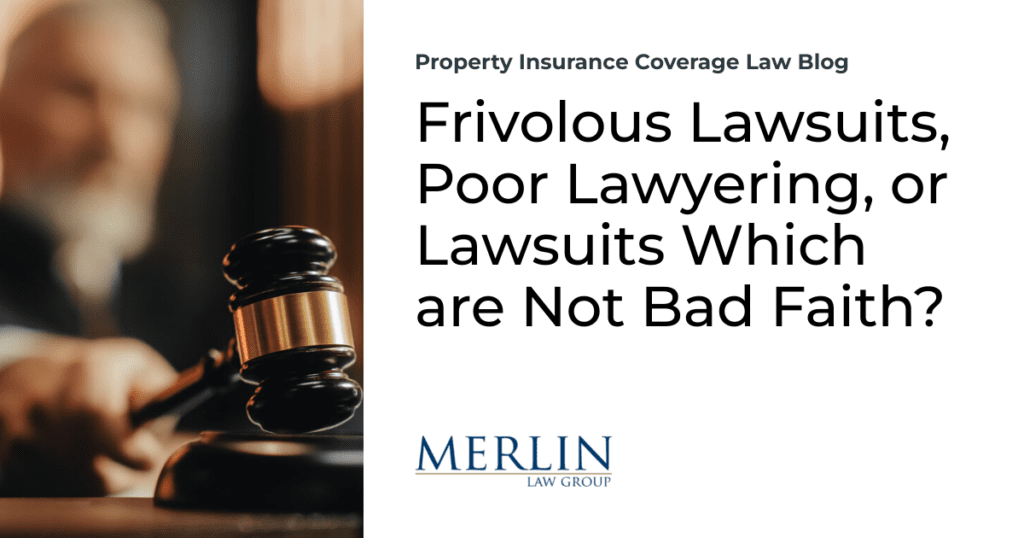Frivolous Lawsuits, Poor Lawyering, or Lawsuits Which are Not Bad Faith?

I recently appeared on a Public Broadcasting Service show discussing the ongoing insurance crisis in Florida. During the segment, an insurance industry expert attributed insurance companies’ skyrocketing premiums, unresolved claims, and financial troubles to what they termed as ‘frivolous lawsuits’, along with the contingent fees of lawyers and public adjusters. As I listened, it struck me how there’s a glaring lack of accountability from the insurance industry’s side in this situation. The truth often seems obscured, with industry representatives habitually deflecting blame rather than engaging in honest self-reflection.
Conversely, I came across a freeze loss lawsuit recently won by AmGuard.1 This case serves as an important reminder for policyholders about the significance of thoroughly vetting the credentials, experience, and track record of lawyers before hiring them. It’s crucial for lawyers to rigorously assess claims before initiating legal action, ensuring the legitimacy of the claim and the active involvement and agreement of the client regarding the litigation process, which is inherently challenging.
In their eagerness to secure a client, I’ve observed that some lawyers might make overly optimistic statements such as, “Don’t worry, these cases always settle.” My advice is to be wary of such assurances. Opting for a quick settlement often results in accepting far less than what is fair or deserved, based on a misconception that litigation is straightforward or ‘easy.’ As a lawyer, it’s essential to approach the selection of your attorney with discernment and find one who is committed to seeking justice for you rather than an expedient resolution to obtain a quick fee.
It is not a secret that our law firm has been following AmGuard, as noted in Bad Faith Verdict Upheld. So, I studied how this case was lost and found that the only specific pleading that indicated any specific versus general facts was this one, and the only thing specific was the dollar amount of the dispute:
From and after the time Plaintiffs Claim was presented to Defendant, Defendant’s liability to pay the full claim in accordance with the terms of the Policy was reasonably clear. However, Defendant has refused to pay Plaintiff in full, despite there being no basis whatsoever on which a reasonable insurance company would have relied to deny the full payment. Specifically, Defendant erroneously undervalued Plaintiffs claim by erroneously determining her claim to be worth only $1,671.85; in fact, Plaintiff’s claim is at least valued at $56,126.67. As such, Defendant’s conduct constitutes a breach of the common law duty of good faith and fair dealing.
The better modern practice of law is to place specific details into the complaint with dates, evidence, and facts that demonstrate why more is owed and why the insurance company acted in bad faith. To do this, attorneys must spend time with the client before the lawsuit is filed to make certain that the case has a solid factual basis. Just because the insurance company has one estimate of damage different from the policyholder’s estimate does not mean the insurance company has done anything wrong in its claims handling.
AmGuard eventually moved for summary judgment, and in response, the policyholder’s attorney filed nothing other than to move to withdraw from the lawsuit. The attorney apparently sent a letter months earlier to the client saying he was not able to get in touch with the client. The client has to be on board with the work that is going to be required and an active participant. I have no idea why the attorney did not file a motion to withdraw much sooner.
The result could be predicted by anyone. With no evidence presented to rebut the motion for summary judgment, the court found for AmGuard.
Was this a frivolous lawsuit—one with no merit at the time it was filed? Who knows? There was literally nothing done by the attorney for the policyholder. Maybe that attorney had good reason to do nothing. But I do not know of a reason to do nothing if the case had been properly prepared before filing the lawsuit. There certainly seemed to be evidence that more was owed, but the attorney did not file anything in response to the motion.
My experience and belief is that it is rare that property insurance lawsuits are frivolous. The amounts owed may be less than what can be won after hearing all sides to the story. However, the amounts claimed are always much more than the insurance company has paid and the policyholder honestly believes is owed. Yet, cases like the one cited above do nothing but beg for questions about why the claim was filed in the first place and how it could so easily have been lost.
Thought For The Day
If there were no bad people, there would be no good lawyers.
—Charles Dickens
1 Castro v. AmGUARD Ins. Co., No. 4:22-cv-00291 (S.D. Tex. Nov. 8, 2023).



